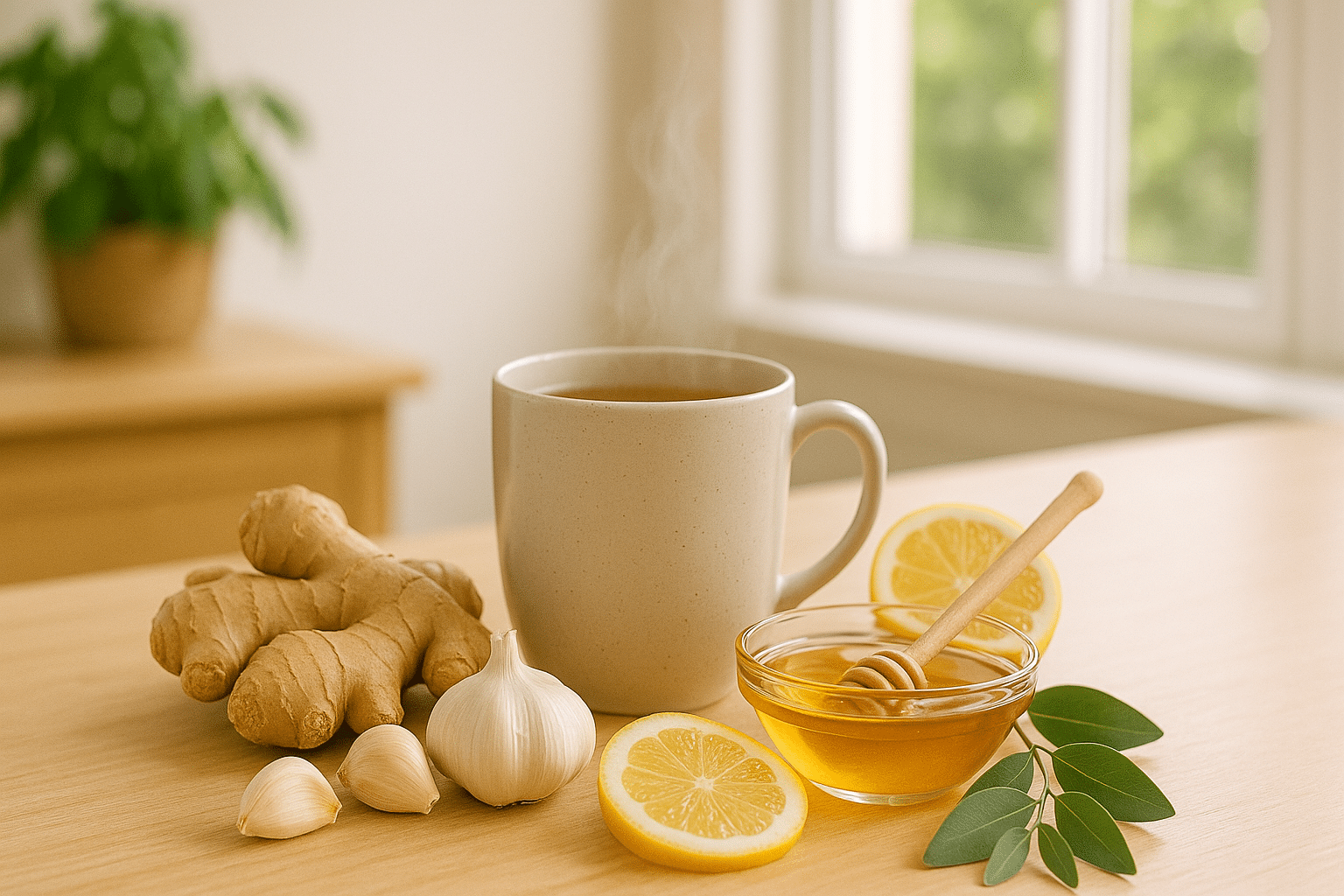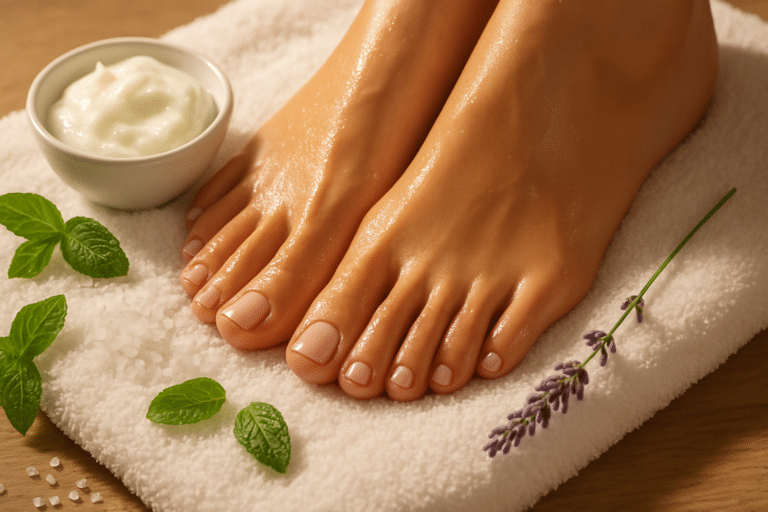Sinus Infections: 12 Effective Home Remedies to Clear Your Sinus Infection

If you’ve ever dealt with a sinus infection, you know how uncomfortable it can be. Fortunately, there are effective home remedies that can help you find relief without the need for prescription medications. From nasal irrigation to essential oils, these methods can ease your symptoms and promote healing. But which remedies are truly the most effective? Let’s explore some practical solutions that could clear your sinus infection and improve your overall well-being.
Nasal Irrigation With Saline Solutions
Nasal irrigation with saline solutions can be a game-changer for managing sinus infections, especially when you want quick relief. This simple practice clears allergens and debris, reducing inflammation in your nasal passages. It thins thick mucus, making it easier for you to expel through blowing or coughing. Plus, the saltwater solution prevents bacterial growth, lowering your risk of further infections.
Regular rinsing can lead to over 60% symptom improvement in chronic sinusitis and even reduce your dependence on antibiotics. You can choose between isotonic and hypertonic saline, but always use distilled or sterile water for safety. This method also removes allergens like dust and pollen, contributing to a clearer nasal passage. With daily use, you’ll likely notice a significant boost in your overall comfort and quality of life.
Additionally, the use of warm saline is crucial, as it does not irritate mucous membranes during the rinsing process. Furthermore, nasal rinsing clears clogged pathways in the sinuses, which can help alleviate pressure and pain associated with sinus infections. Moreover, it is supported by evidence that saline nasal irrigation improves mucociliary function, which can enhance your body’s natural defense against infections. Staying hydrated through consistent water intake is also beneficial for maintaining moisture in the nasal passages.
Steam Inhalation for Mucus Relief
Steam inhalation can provide effective relief for mucus buildup during sinus infections. By introducing warm, moist air to your nasal passages, it helps loosen mucus and reduce irritation in inflamed sinuses. This method hydrates dry nasal tissues, temporarily easing pressure and improving airflow. While steam inhalation offers short-term relief, especially for acute upper respiratory infections, it’s important to remember it doesn’t directly tackle the infection itself.
Additionally, steam inhalation may enhance comfort during the recovery process. However, recent studies have shown that steam inhalation is ineffective for relieving chronic sinus congestion symptoms. For best results, try the hot water bowl method, positioning your head 8-12 inches above boiling water, and using a towel tent for added steam concentration. Limit sessions to 5-15 minutes, 2-4 times daily, but be cautious of burns. Always supervise children and avoid this method if you have asthma to prevent complications.
Incorporating steam treatment can also soothe pain from sinus inflammation, making the experience more manageable. Moreover, steam inhalation may have anti-inflammatory effects on the respiratory system, providing further relief during your recovery. Additionally, steam inhalation can be enhanced by adding essential oils like eucalyptus to improve its soothing effects.
Over-the-Counter Decongestants
When you’re dealing with sinus congestion, over-the-counter decongestants can be a quick solution. You’ll find them in various forms, such as nasal sprays, drops, and oral medications, each with its own usage guidelines. Common pain relievers can also be used in conjunction to help ease the discomfort caused by sinus pressure. Understanding the differences and knowing how to use them properly can make a big difference in your relief. However, it’s important to note that oral phenylephrine is now considered ineffective for congestion relief, so be sure to check labels for more effective options. Nasal decongestants relieve stuffy noses by narrowing and reducing swelling in blood vessels and tissues in the nose. Recent findings indicate that oral phenylephrine’s ineffectiveness is due to its inability to provide relief comparable to a placebo.
Types of Decongestants
Decongestants are a go-to solution for relieving nasal congestion caused by sinus infections and allergies. You have several types to choose from.
Oral tablets like pseudoephedrine (Sudafed) and phenylephrine (Sudafed PE) provide effective relief. If you prefer nasal sprays, options like oxymetazoline (Afrin) work quickly but should be used cautiously to avoid rebound congestion.
You might also opt for liquid formulations that combine decongestants with antihistamines or pain relievers. For a convenient option, powdered drink mixes containing phenylephrine can offer relief too. Many decongestants can be purchased without a prescription, making them easily accessible for those in need. Consult a pharmacist for advice on specific products to ensure you choose the right one for your symptoms. Nasal decongestants are important for treating colds, allergies, and sinus infections.
Combination products like Claritin-D® target multiple symptoms at once, making them a handy choice when you’re feeling under the weather. Always consider your specific symptoms when selecting the right decongestant for you.
Proper Usage Guidelines
To guarantee you get the most benefit from over-the-counter decongestants, it’s essential to follow proper usage guidelines. Here’s how to make certain safe and effective use:
- Follow Dosage Instructions: Always adhere to the recommended dosage on the label. For example, don’t exceed 60 mg of pseudoephedrine in a 24-hour period. Decongestants narrow blood vessels, reducing swelling and allowing for easier airflow. Additionally, be mindful of preexisting medical conditions, as they may influence the choice and dosage of decongestants. It is especially important to note that pseudoephedrine is available in various forms.
- Avoid Combination Use: Don’t take multiple OTC decongestants simultaneously unless directed by a healthcare provider. Check for similar active ingredients to prevent overdose.
- Store Properly: Keep medications in a cool, dry location, away from children. Use the measuring spoon provided for liquid medications to guarantee accurate dosing.
Hydration: The Key to Mucus Thinning
Although many factors contribute to sinus health, staying properly hydrated is essential for thinning mucus and preventing blockages.
When you drink enough water, your mucus stays thin, allowing it to flow freely through your sinus passages. This prevents mucus from becoming thick and stagnant, which can lead to infections. By maintaining hydration, you help your body capture and eliminate foreign particles and microbes more effectively. Hydrated sinuses are also more resilient to infections and inflammation, reducing discomfort.
Optimal hydration influences mucus production, which plays a crucial role in protecting sinus passages. Additionally, dehydration can worsen sinus pressure and headaches, making it even more crucial to keep your body well-hydrated to avoid these symptoms. Using a humidifier can assist in keeping mucus thin, further enhancing the benefits of hydration. Increased water loss during exercise can heighten the risk of dehydration, emphasizing the need for fluid intake when active.
To support your sinus health, aim to drink fluids regularly throughout the day. Consider hot drinks, as they can further loosen mucus. Staying hydrated also helps regulate body temperature, which is important for overall health, especially during illness.
Incorporate hydration into your routine, and you’ll promote clearer airways and overall respiratory well-being.
Hot Foot Baths for Circulation Improvement
Hot foot baths can remarkably improve circulation in your lower limbs, making them a simple yet effective home remedy for sinus infections. By immersing your lower legs in 41°C warm water for just 10 minutes, you can greatly boost blood flow—comparable to high-intensity exercise. This method not only enhances circulation but also offers additional benefits like relaxation and muscle cramp relief.
In addition, foot health is linked to systemic circulation and metabolism, enhancing nervous and endocrine system regulation. Regular foot soaks using Epsom salt can further contribute to muscle relaxation and stress relief, enhancing the overall experience.
Research indicates that hot foot baths can help balance circulation and decrease congestion in other areas of the body. Incorporating regular exercise can also complement the benefits of hot foot baths by reducing inflammation throughout the body.
Here are three key points to keep in mind:
- Efficacy: Low-leg bathing targets specific areas, improving circulation without the risks associated with full-body immersion.
- Safety: Maintaining a moderate temperature reduces the risk of burns and cardiovascular strain.
- Convenience: Setting up a foot bath is quick and easy, allowing you to enjoy the benefits without hassle.
Herbal Supplements for Sinus Health
When it comes to sinus health, herbal supplements can be a game changer. You’ll find ingredients like Sinupret, which helps thin mucus and boost your immune system, and other herbs that offer anti-inflammatory benefits. Exploring these natural options might provide the relief you need for sinus infections. Additionally, using herbal supplements can help reduce inflammation, which is crucial for alleviating sinusitis symptoms.
Many of these supplements work by targeting sinus tissues inflammation, promoting overall respiratory health. Given that chronic sinusitis prevalence affects a significant number of individuals, incorporating herbal remedies could be an effective strategy in managing symptoms.
Herbal Remedies Overview
Many people turn to herbal remedies as a natural approach to support sinus health.
These remedies can offer relief and improve your overall well-being. Here are three effective options to evaluate:
- Sinupret: This herbal blend combines ingredients like *Primula veris* and *Sambucus nigra*, providing mucosal support and reducing symptoms. Additionally, ginger’s immune system support can further enhance the effectiveness of these herbal remedies.
- Cineole: Known for its rapid symptom relief, cineole extract can help with acute post-viral rhinosinusitis.
- Oil of Oregano: Inhaling this via steam can aid sinus clearance and boost infection resistance. Additionally, these herbal remedies may enhance your body’s infection-fighting ability by supporting overall immune function.
Incorporating these herbal remedies into your routine may enhance your sinus health and provide much-needed relief from discomfort.
Always consult with a healthcare professional before starting any new supplement.
Key Ingredients Benefits
Herbal supplements can be a powerful ally in promoting sinus health, thanks to their key ingredients that offer various benefits.
For instance, Ageratum conyzoides reduces inflammation and swelling, making it effective against sinusitis. Pelargonium sidoides helps control symptoms of rhinosinusitis, especially after viral infections. Sambucus nigra supports your immune system, while Gentiana lutea aids digestion and provides anti-inflammatory effects.
Primula veris promotes mucosal health in your sinuses. Additionally, supplements like Sinupret contain mucolytic properties that thin mucus for better drainage.
These herbs also boast antiviral and antibacterial activities, enhancing your overall sinus health. Together, these key ingredients work synergistically to relieve symptoms and support your body’s defenses against infections.
Vitamin C and Zinc for Immune Support
Vitamin C and zinc play essential roles in supporting your immune system, helping to fend off infections like sinusitis. These nutrients work together to enhance your body’s defenses and can alleviate symptoms associated with sinus infections.
- Immune Support: Vitamin C boosts immune responses and reduces the severity of colds, while zinc is important for maintaining a strong immune system. Additionally, staying hydrated can help thin mucus, further supporting your immune function. Furthermore, zinc’s immune-boosting properties are critical in promoting tissue repair during recovery.
- Symptom Relief: Their combination can lessen congestion and improve respiratory health, potentially speeding up recovery. Additionally, n-acetylcysteine’s mucus-thinning properties may further support healthy sinus function.
- Preventing Deficiencies: Adequate intake of both nutrients helps prevent immune deficiencies, making it easier to fight off infections.
Incorporating vitamin C and zinc into your daily routine can greatly bolster your immune function and promote overall respiratory health.
N-acetyl Cysteine (NAC) for Enhanced Drainage
N-acetyl cysteine (NAC) can play an essential role in enhancing drainage. Its mucolytic action breaks down mucus, making it easier to expel. By neutralizing oxidative stress, NAC protects your sinus tissues, while improving cilia function boosts nasal mucus transport. This can be especially beneficial when combined with antibiotics like levofloxacin, enhancing mucus removal. For individuals with sinusitis triggers such as allergies or respiratory infections, NAC may provide additional relief by addressing underlying inflammation.
Notably, recent studies indicate that NAC irrigation can lead to significant improvements in postnasal drip symptoms after surgery for chronic rhinosinusitis. Moreover, antioxidant support from NAC can further enhance your immune function, aiding in your recovery during sinus infections. Research has shown that N-acetylcysteine improves nasal mucociliary clearance, which is crucial for effective sinus drainage.
For chronic sinusitis, a typical dosage ranges from 600 to 1,200 mg per day. Generally well-tolerated, NAC can help you manage sinus pressure and improve your overall recovery, especially post-surgery.
Consider adding it to your regimen for better sinus health.
Essential Oils for Aromatherapy Relief
Essential oils offer a natural approach to alleviating sinus congestion, making them a valuable addition to your wellness routine.
Here are three effective essential oils you can use:
- Peppermint oil: This oil stimulates cold receptors in your nasal passages, helping to thin mucus and ease congestion. Inhaling peppermint oil can open airways and clear mucus effectively. Additionally, the menthol in peppermint oil helps to stimulate cold receptors that can further improve airflow. Furthermore, peppermint oil’s antibacterial properties make it particularly effective against sinus infections.
- Eucalyptus oil: Known for its powerful decongestant properties, it effectively relieves sinus pressure. Eucalyptus oil (1,8 cineole) has also been found effective for sinusitis without antibiotics, as it has anti-inflammatory effects.
- Tea tree oil: With antiseptic and anti-inflammatory benefits, it combats sinus infections while promoting overall respiratory health.
You can use these oils through diffusion, steam inhalation, or topical application with a carrier oil.
Incorporating essential oils into your routine can provide you with soothing relief and enhance your sinus health naturally.
Lifestyle Changes to Prevent Sinus Infections
To prevent sinus infections, you should focus on reducing environmental irritants and maintaining ideal humidity levels in your home. Keeping your living space clean and using a humidifier can make a significant difference in your sinus health. Additionally, practicing good nasal hygiene by blowing your nose gently and washing your hands frequently can help prevent infections. Incorporating allergy testing into your routine can help identify specific triggers that may exacerbate your sinus issues. Being aware of chronic sinusitis can also guide you in taking proactive measures to manage your sinus health effectively. Furthermore, staying hydrated is essential for maintaining healthy mucus levels, which can aid in preventing sinus blockages.
Reduce Environmental Irritants
Reducing environmental irritants is essential for maintaining sinus health, especially if you’re prone to infections.
To create a healthier living environment and minimize irritation, consider these strategies:
- Avoid Smoking: Quitting smoking dramatically lowers sinus inflammation and infection risk.
- Use Air Purifiers: These devices effectively remove allergens and pollutants from the air, protecting your sinuses. Additionally, keeping surfaces clean and disinfected can further enhance hand hygiene practices in your home. Ensure that the air in your home is adequately moist and humidified to prevent dryness that can irritate your sinuses. It’s important to remember that many people with sinus issues may also have environmental allergies, which can exacerbate symptoms. Maintaining proper nasal hydration is crucial to prevent sinus infections from occurring in the first place.
- Limit Exposure to Allergens: Regularly clean your home to control dust, mold, and pet dander.
Maintain Optimal Humidity
Maintaining ideal humidity in your home can greatly impact your sinus health, especially if you’re prone to infections. Aim to keep humidity levels between 30% and 50%.
High humidity fosters mold and dust mites, worsening allergies and sinus issues. Conversely, dry air can irritate your sinuses, so find a balanced approach. Use a hygrometer to monitor humidity and adjust as needed, especially during seasonal changes.
Be cautious when the dew point approaches 70°F, as it signals high humidity that increases infection risk. Regularly clean your humidifier to prevent bacterial growth.
Avoiding Common Allergens
If you want to alleviate sinus infections, avoiding common allergens is essential. Reducing your exposure to these triggers can greatly improve your symptoms.
Here are three effective strategies to contemplate:
- Use HEPA Filters: Invest in HEPA air purifiers to trap allergens like pollen and dust, keeping your air clean.
- Regular Cleaning: Vacuum and dust frequently to minimize dust mites, mold, and pet dander in your home environment.
- Pet-Free Zones: Create areas in your home, like bedrooms, where pets aren’t allowed to lessen your exposure to pet dander.
Implementing these steps can help you breathe easier and reduce sinus infection occurrences, leading to a healthier and more comfortable living space.
Monitoring Symptoms and Seeking Medical Help
Avoiding common allergens can greatly improve your sinus health, but monitoring your symptoms closely is just as important.
Track how long your symptoms last; if they exceed 10 days, you may have a bacterial infection. Pay attention to the color of your nasal discharge—green or gray indicates infection, while clear suggests improvement.
If facial pain worsens after a week or you have a recurring fever over 101°F, seek medical help. Sudden, severe headaches or vision changes signal emergencies.
If symptoms linger beyond 12 weeks or you experience recurrent infections, consider allergy testing or imaging.
Always consult a healthcare professional if you notice significant changes or worsening conditions; early intervention is key to avoiding complications.
Frequently Asked Questions
Can Sinus Infections Cause Headaches or Facial Pain?
Yes, sinus infections can cause headaches and facial pain. You might experience pressure in your forehead, cheeks, or around your eyes due to inflammation and congestion, which can amplify your discomfort and affect daily activities.
How Long Does a Typical Sinus Infection Last?
A typical sinus infection lasts about 7-10 days for uncomplicated cases. If your symptoms persist beyond this timeframe, it’s wise to consult a healthcare professional for further evaluation and potential treatment options.
Are Sinus Infections Contagious to Others?
Sinus infections themselves aren’t contagious. However, the viruses causing them can spread through respiratory droplets or contaminated surfaces. You should practice good hygiene to minimize your risk of catching those viruses from others.
What Are the Signs of a Chronic Sinus Infection?
You’ll notice signs of a chronic sinus infection if you experience persistent nasal congestion, facial pain, colored nasal drainage, postnasal drip, and a reduced sense of smell lasting over 12 weeks. Don’t ignore these symptoms!
When Should I See a Doctor for Sinus Issues?
If your symptoms linger beyond 7-10 days, you develop a high fever, or experience worsening pain, it’s time to see a doctor. Don’t hesitate if you have existing health conditions that could complicate things.
Conclusion
Incorporating these home remedies into your routine can greatly alleviate the discomfort of sinus infections. From nasal irrigation to steam inhalation, you have effective options at your fingertips. Don’t forget the importance of staying hydrated and maintaining a healthy environment to prevent future issues. By being proactive and attentive to your symptoms, you can manage your sinus health more effectively. If symptoms persist, don’t hesitate to seek medical advice for further support.
References
- https://pmc.ncbi.nlm.nih.gov/articles/PMC7118523/
- https://newsnetwork.mayoclinic.org/discussion/home-remedies-self-help-for-sinusitis/
- https://www.health.harvard.edu/diseases-and-conditions/what_to_do_about_sinusitis
- https://www.healthline.com/health/how-to-get-rid-of-sinus-infection
- https://naturopathic.org/news/575481/How-Naturopathic-Doctors-Treat-Sinus-Infections.htm
- https://www.uclahealth.org/news/article/risks-and-rewards-of-nasal-rinses-what-you-need-to-know
- https://www.columbiadoctors.org/news/nasal-rinsing-solution-your-sinuses-have-been-waiting
- https://www.aentassociates.com/the-benefits-of-a-nasal-rinse/
- https://www.fda.gov/consumers/consumer-updates/rinsing-your-sinuses-neti-pots-safe
- https://www.aafp.org/pubs/afp/issues/2009/1115/p1117.html






